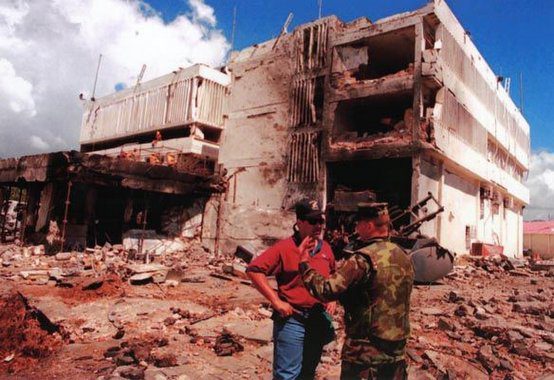Why the NSA Debate Will, and Must, Continue

President Obama’s decision to close embassies and consulates across the Middle East and North Africa has added yet another twist in this summer’s NSA revelations saga. Lawmakers who have been briefed on the terror threat are calling it credible, specific, and alarming, according to the Washington Post.
But civil libertarians are alarmed that these threats will create a climate of fear in which the debate about the NSA’s vast data collection will be scuttled.
Glenn Greenwald, the reporter-activist who has served as a megaphone for revelations about and criticisms of U.S. government surveillance activities, went so far as to suggest that the embassy closings could be an effort to distract from the heightened scrutiny. He told Democracy Now,
Here we are in the midst of one the most intense debates, and sustained debates, that we’ve had in a very long time in this country over the dangers of excess surveillance, and suddenly an administration that has spent two years claiming that it has decimated Al-Qaeda decides that there is this massive threat that involves the closing of embassies and consulates throughout the world.
Even if we trust that the embassy closures are well-justified, we should still protest loudly when the specter of terrorism is used to distract from a vital civil liberties debate. Conspiracy or no, the embassy closings provide an all-too-easy way for NSA defenders to cudgel surveillance skeptics. That’s the real scandal, and it’s one we’ve seen before.
“These [NSA] programs are controversial, we understand that,” Sen. Saxby Chambliss (R-GA) told NBC’s Meet the Press on Sunday. “But they are also very important … If we did not have these programs, then we simply would not be able to listen in on the bad guys.”
He was just one of several Congressional supporters of the NSA making the rounds on the Sunday morning talk shows to defend the NSA.
Granted, not all lawmakers painted in as broad strokes (“these programs”) as Chambliss did. Rep. Adam Schiff (D-CA) admitted that one of the more controversial NSA programs, the collection of cell phone metadata, was not necessarily involved in detecting the Al Qaeda plot. “You have to be careful how much you represent that any particular program has contributed to our security,” he told CNN.
Even if the NSA’s vast surveillance powers helped us “listen in on the bad guys” to prevent an attack, this fact should not weaken any truly principled concern about government snooping. The question has never have been, “are the NSA programs intrusive and useless?” but rather, “even if they are useful, how much privacy are we willing to sacrifice for the security they bring?”
Rep. Justin Amash, to his credit, pivoted directly from the embassy threats back to Constitutional liberties:
“It’s precisely because we live in this dangerous world that we need protections like the Fourth Amendment,” he told Fox News. “The framers of the Constitution put it in place precisely because they were worried that you could have national security justifications for violating people’s rights.”
“Chatter” is the word of the week—it refers to intercepted Al Qaeda messages. But it also describes our degraded conversation about civil liberties, in which the first hint of danger can shut down any scrutiny of the national security state.
Comments